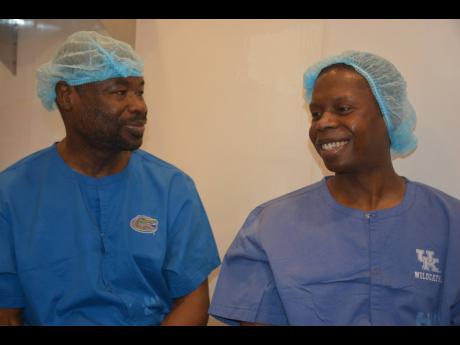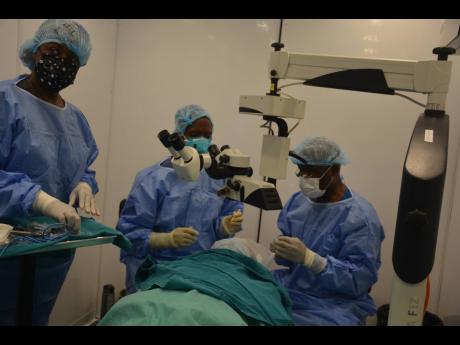Restoring vision for the needy
Medical team pours effort into treatment of eye problems for free
WESTERN BUREAU:
RETIRED TRUCKER Oliver Dean has been suffering with cataract disease long before COVID-19 placed a spoke in the wheels of surgeries at Cornwall Regional Hospital (CRH), while Darius Gayle sees disjointed lines before his eyes each time he opens them.
The two men, who have been on a waiting list, one for three years, were among 65 patients booked for life-changing eye surgeries by Jamaican American noted ophthalmologists Dr Basil Morgan and Dr Giovanni Greaves, who are part of a 23-strong contingent giving free service prescribing glasses, repairing eyesights, reducing a backlog stifling the healthcare system, while offering hope to many who may have lost optimism.
Dr Morgan, an assistant professor at Johns Hopkins, is on his fourth ‘give back’ to Jamaica trip, while Dr Greaves, who is based at PIH (Presbyterian Inter-community Health) in Southern California, is getting his baptism in an area mainly visited by some of the most vulnerable in the island.
“Because of the non-functional status of the hospital, there has been a backlog of surgery and eye care,” Dr Morgan tells The Gleaner, while busy putting on his mask in preparation for the first of 13 patients on the list on Monday for surgery.
“We are doing cataracts, glaucoma and Pterygium, which is a raised, fleshy, triangular-shaped growth on the eye’s conjunctiva,” explained the doctor of over 30 years and renowned for success stories.
Pterygium occurs when there is long-term exposure to UV light. The eyes may be red, swollen and irritated in mild cases, but if the condition continues one’s vision may be blocked or blurred.
Other members of the team were fanned out in satellite clinics doing screening, refraction, prescribing glasses and manufacturing and giving out glasses to Jamaicans on the western end of the island.
Shortage of facilities
And while there was no shortage of patients, Dr Morgan lamented the shortage of facilities amid an overwhelming demand for care, hence the use of a makeshift unit that mirrors a first-world facility.
In response to the hospital’s inability to provide adequate facility, the University of Michigan Engineering Department pioneered the revolutionary solution – repurposing shipping containers into fully functional operating theatres.
These refurbished containers boast state-of-the-art facilities, complete with microscopes and everything found in a standard hospital.
What’s more, the self-contained nature of the units, powered by solar collectors, allows for mobility, offering a glimmer of hope to regions lacking medical infrastructure.
“A wonderful concept and if this works here, it can be pushed out in different areas because it can be moved. The concept was to create a pod that is mobile,” said an enthused Dr Morgan.
His ophthalmologist partner, Dr Greaves, was just as optimistic, explaining that the potential for replication in various regions was significant, promising a scalable solution to a global healthcare challenge.
Both men and their nursing assistant, along with head of the ophthalmology unit at the hospital, Dr Charmaine Scarlett and her team, worked up until close to midnight on Monday.
“They didn’t bother to stop for lunch. They went straight through,” revealed Dr Winsome Leslie, Dr Morgan’s better half.
Patients, ranging from those on the verge of legal blindness to those struggling with daily activities due to poor eyesight, find solace in the expertise of Dr Greaves, Dr Morgan, and their team.
The service, provided free of charge, is not only a lifeline for individuals facing financial constraints, but also a beacon of hope for those who had resigned themselves to a life of impaired vision.
“I have been waiting since COVID. And today I am trusting in God, because everything that I see looks dark,” stated Dean.
For Gayle, even during his interview with The Gleaner, he said the area looked glossy.
“The doctors who did the screening say there are scar tissues at the back of my eyes, and blood that looks like it has dried up,” he told The Gleaner, anxious to make it into the theatre.
The financial burden associated with eye surgeries is a formidable obstacle for many. In a traditional hospital setting in the United States, the costs per care could soar to between US$7,000 and $10,000.
Dr Morgan, having served internationally, returns to Jamaica to give back to his homeland, exemplifying the spirit of altruism that underscores this initiative.
“We are part of a team of 23, fanned out in satellite clinics. But there is no there’s no shortage of patients when we have a shortage of facilities to accommodate them,” said Dr Morgan.


